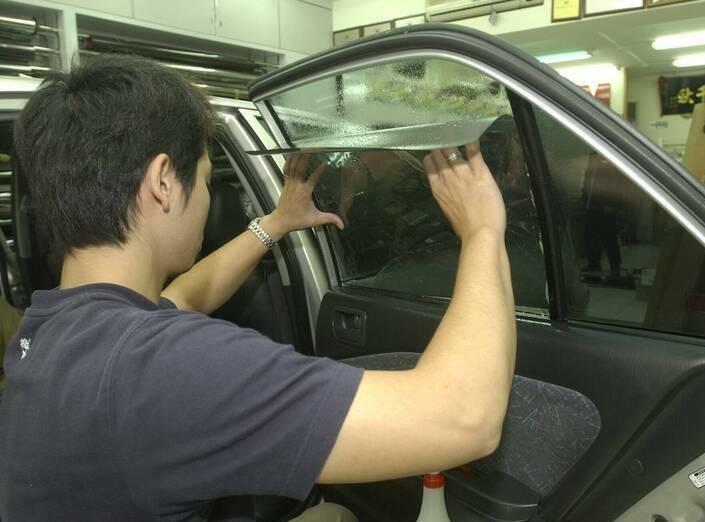The Ministry of Transportation and Communications is to propose new guidelines next month on vehicle window tint before amending relevant laws next year.
The announcement today comes after civil groups, including the Taiwan Vision Zero Alliance, and lawmakers have criticized current guidelines for not having an enforcement mechanism.
Window tints present a safety hazard, as they have the potential to make pedestrians difficult to see from the inside of a vehicle, especially at night.

Photo: Taipei Times
New guidelines would potentially mandate window tints of more than 70 percent for the front windshield and front windows, and 35 percent for the rear windshield and rear seats, although guidelines have yet to be finalized.
Window tints are rated on light transmission, with 100 percent being a transparent window and 0 percent completely opaque.
A tint of 70 percent would mean that 70 percent of light is transmitted, while only 30 percent is blocked.
Mandatory regulations and binding regulations, rather than guidelines, must be established, the alliance said.
In a meeting of the Legislative Yuan’s Transportation Committee today, Chinese Nationalist Party (KMT) Legislator Hung Mong-kai (洪孟楷) said window tints should be regulated with mandatory penalties, and included in road safety regulations.
Other countries, including the US, Japan and Germany, have strict regulations on window tints, but Taiwan has no inspection requirements, no way to conduct the inspections and no standards for old cars, Hung said.
Additionally, regulations for new and old cars should be largely the same, and any differences between them clearly defined, Hung added.
Guidelines on window tints would be issued next month and mandatory requirements with penalties would start next year, Deputy Minister of Transportation and Communications Chen Yen-po (陳彥伯) said.
New cars are subject to relevant regulations, Chen said, adding that new and old cars are divided based on their model year.
Window tint regulations have not been clear to the public, Highway Bureau Director-General Chen Wen-juei (陳文瑞) said.
This amendment would be carried out in stages, with guidelines next month to focus on public awareness, and regulations to be revised and enforced next year, Chen added.
In the future, window tints that do not abide by regulations would cause a vehicle to fail an inspection, Chen said.
Under current regulations, a car that fails inspection would have to be repaired and reinspected within a month. Failing that too, it would have its license plate suspended.
After six months of not passing inspection, the car’s license plate would be revoked.
Owners who fail to get their cars inspected when required are fined between NT$900 and NT$1,800.
Additional reporting by CNA

Taipei, New Taipei City, Keelung and Taoyuan would issue a decision at 8pm on whether to cancel work and school tomorrow due to forecasted heavy rain, Keelung Mayor Hsieh Kuo-liang (謝國樑) said today. Hsieh told reporters that absent some pressing reason, the four northern cities would announce the decision jointly at 8pm. Keelung is expected to receive between 300mm and 490mm of rain in the period from 2pm today through 2pm tomorrow, Central Weather Administration data showed. Keelung City Government regulations stipulate that school and work can be canceled if rain totals in mountainous or low-elevation areas are forecast to exceed 350mm in

TRAFFIC SAFETY RULES: A positive result in a drug test would result in a two-year license suspension for the driver and vehicle, and a fine of up to NT$180,000 The Ministry of Transportation and Communications is to authorize police to conduct roadside saliva tests by the end of the year to deter people from driving while under the influence of narcotics, it said yesterday. The ministry last month unveiled a draft of amended regulations governing traffic safety rules and penalties, which included provisions empowering police to conduct mandatory saliva tests on drivers. While currently rules authorize police to use oral fluid testing kits for signs of drug use, they do not establish penalties for noncompliance or operating procedures for officers to follow, the ministry said. The proposed changes to the regulations require

EVA Airways president Sun Chia-ming (孫嘉明) and other senior executives yesterday bowed in apology over the death of a flight attendant, saying the company has begun improving its health-reporting, review and work coordination mechanisms. “We promise to handle this matter with the utmost responsibility to ensure safer and healthier working conditions for all EVA Air employees,” Sun said. The flight attendant, a woman surnamed Sun (孫), died on Friday last week of undisclosed causes shortly after returning from a work assignment in Milan, Italy, the airline said. Chinese-language media reported that the woman fell ill working on a Taipei-to-Milan flight on Sept. 22

1.4nm WAFERS: While TSMC is gearing up to expand its overseas production, it would also continue to invest in Taiwan, company chairman and CEO C.C. Wei said Taiwan Semiconductor Manufacturing Co (TSMC) has applied for permission to construct a new plant in the Central Taiwan Science Park (中部科學園區), which it would use for the production of new high-speed wafers, the National Science and Technology Council said yesterday. The council, which supervises three major science parks in Taiwan, confirmed that the Central Taiwan Science Park Bureau had received an application on Friday from TSMC, the world’s largest contract chipmaker, to commence work on the new A14 fab. A14 technology, a 1.4 nanometer (nm) process, is designed to drive artificial intelligence transformation by enabling faster computing and greater power